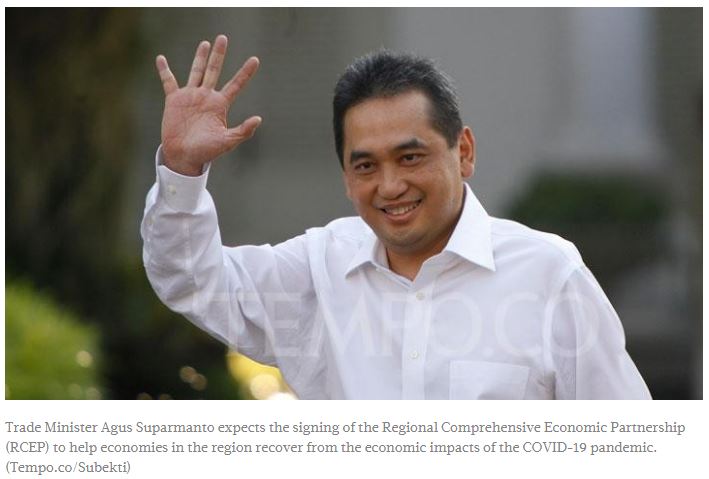Indonesia looks to sign RCEP this year to support economic recovery
Indonesia and 14 other negotiating countries agreed Tuesday to sign the Regional Comprehensive Economic Partnership (RCEP) this year to help their economies recover from the pandemic-induced downturn.
Iman Pambagyo, who has led the RCEP trade negotiating committee since 2013, said he expected the deal to be signed in November. Countries have so far agreed on the text of the agreement and almost completed the legal review of the text, called legal scrubbing.
If signed, the trade deal, introduced at the ASEAN Summit in Cambodia in 2012, will create one of the world’s largest economic blocs, as the negotiating countries account for 30 percent of global GDP.
“With respect to the COVID-19 pandemic, the finalization of the RCEP this year gives hope that economies in the region and around the world will recover, the regional supply chain will be strengthened and confidence in the open and rules-based international trade system will be restored,” Trade Minister Agus Suparmanto said in a statement on Tuesday after a virtual meeting with his regional counterparts.
The meeting came at a time when countries, including Indonesia, are struggling to reemerge from various degrees of lockdown as they seek to ease the severity of the pandemic’s impacts on their economies. The Indonesian government forecasts an economic growth rate of 1 percent this year, the lowest rate in 19 years, and has even warned of a 0.4 percent contraction under a worst case scenario.
The pandemic has also battered international trade and disrupted global supply chains, with factories around the world being forced to close as countries seek to contain the virus.
The World Trade Organization (WTO) has projected that global trade will shrink by between 13 and 32 percent this year as the scale of the economic impacts remain uncertain.
Despite Indonesia’s optimism, ministers from the other negotiating countries, namely the 10 ASEAN member states, China, Japan, South Korea, Australia and New Zealand, still need to persuade India to join the RCEP to get the most out of the trade deal.
“India, as an original participating country, has a strategic role in the progress, prosperity and supply chain of the region,” said Agus, a National Awakening Party politician. “Thus, we remain open to India rejoining the RCEP in the future.”
India withdrew from negotiations in November 2019 because of concerns about its growing trade deficit with China. Indian businesspeople have expressed concern the RCEP could result in an influx of cheap goods from China and dairy products from Australia.
The situation worsened recently after the Indian army said at least 20 of its soldiers had been killed in clashes with Chinese troops at a disputed border site between the two countries earlier this month.
India and China are important economic partners for Indonesia. Indian government data reveals that Indonesia has emerged as its second-largest trading partner in the ASEAN region.
Indonesia-India bilateral trade increased from US$4.3 billion from 2005 to 2006 to $21 billion in from 2018 to 2019. The trade value stood at $5.42 billion during the January to May period this year, Statistics Indonesia (BPS) data show.
India is the second-largest buyer of Indonesian coal and crude palm oil.
Meanwhile, China is Indonesia’s largest trading partner, with $25.38 billion in bilateral trade recorded during this year’s first five months.
Source: https://www.thejakartapost.com/news/2020/06/24/indonesia-looks-to-sign-rcep-this-year-to-support-economic-recovery.html


 English
English




